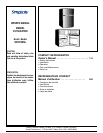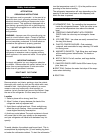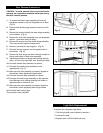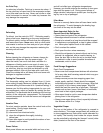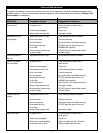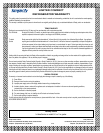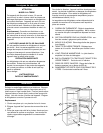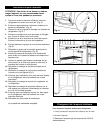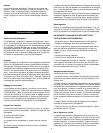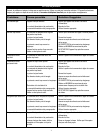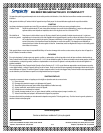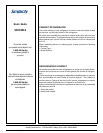
2
Ice Cube Tray
Ice cube tray is flexible. Twist tray to remove ice cubes. If
the ice cube tray is frozen hard to the evaporator surface,
run a little water over the tray. Never use a knife or other
metal instrument to remove ice cube tray because this
may damage the evaporator.
Defrosting
To defrost, turn the control to “OFF”. Defrosting usually
takes a few hours, depending on the room temperature.
To defrost quickly, remove all foods from the refrigerator
and leave doors open. Never use a knife or other metal
instruments to remove ice from and part of your refriger-
ator, as this may damage the evaporator rendering the
warranty null and void.
Cleaning
Before cleaning the refrigerator or freezer, always dis-
connect the refrigerator from the power supply. To
clean the inside, use a soft cloth and a solution of a
tablespoon of baking soda to one quart of water, or a
mild soap suds solution, or some mild detergent. Wash
ice cube tray, drip tray, and glide out shelves in a mild
detergent solution, then dry and wipe with a soft cloth.
Clean the outside with a soft damp cloth and some mild
detergent or appliance cleaner.
Setting the Thermostat
The thermostat setting can be adjusted from #1 (mini-
mum setting) through Maximum (coldest setting) We rec-
ommend setting the thermostat at # 4 (medium setting) If
however you find this setting inappropriate for your cool-
ing requirements, adjust as needed by rotating the ther-
mostat dial. The thermostat dial is located on the front top
section of the refrigerator compartment. The thermostat
controls temperature for both the freezer and refrigerator
compartments.
Vacation Time
For short vacation periods, leave the control knob at the
usual setting. During longer absences;
(a) remove all foods,
(b) disconnect from electrical outlet,
(c) clean the refrigerator thoroughly, including
defrost pan,
(d) leave door open to avoid possible formations of con-
densate, mold or odors.
Power Failure
Most power failures are corrected within an hour or two
and will not affect your refrigerator temperatures.
However, you should minimize the number of door open-
ings while the power is off. During power failures of
longer duration, take steps to protect your food by plac-
ing dry ice on top of packages.
If You Move
Remove or securely fasten down all loose items inside
the refrigerator. To avoid damaging the leveling legs,
turn them all the way into the base.
Some Important Rules for the
Correct Use of the Refrigerator
• Never place hot foods in the refrigerator.
• Beverages should be stored in sealed containers.
• Foods to be stored for a long time should be wrapped
in cellophane or polyethylene, or kept in glass contain-
ers. Never place spoiled foods in the cabinet.
• Don’t overload the cabinet.
• Don’t open the door unless necessary.
• Should the refrigerator be stored without use for long
periods it is suggested, after a careful cleaning, to
leave the door ajar to allow the air to circulate inside
the cabinet in order to avoid possible formations of
condensate, mold or odors.
Food Storage Suggestions
Fresh Food Compartment
• Never cover food compartment shelves with aluminum
foil or any other shelf covering material which may pre-
vent air circulation.
• Always remove porous store wrapping paper from
meats, poultry and fish. Meats should be wrapped
individually and placed in a dish for storage. Wrap fish
and poultry in foil or heavy waxed paper. Most fish
should be used the same day of purchase. Packaged
meats such as ham, bacon, dried beef, or frankfurter,
store best in their original packages.
• Allow warm foods to cool to room temperature before
placing them in the refrigerator.
• Always cover open dishes of food, especially leftovers.
Use leftovers within 2 or 3 days.
Vegetable Crisper
The tray at the bottom of the refrigerator is covered to
retain moisture. The crisper compartment will enable you
to store vegetables and fruits which would otherwise dry
out rapidly. The humidity level inside the crisper drawer
can be controlled by adjusting the “damper” control (white
slider) located on the front of the drawer.
Care and Maintenance



